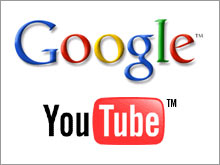|
The future of Goo-Tube Google sees YouTube as a platform for a new advertising model.
(Fortune Magazine) -- When Fortune caught up with YouTube founders Chad Hurley and Steve Chen a few days after Google purchased their company for $1.65 billion, they had very few insights to share - even about what it feels like to have hit the jackpot. "I haven't really thought about it," said Hurley. So for those who have to think about (and understand) the deal, consider it a bid to own the future of TV.
Sure, all you can see on YouTube right now are relatively short, low-resolution clips, but if you imagine a day when we have much fatter digital pipes into the home, you realize that "feeds" à la the YouTube model are a much better and more gratifying way to consume video than the cumbersome video-downloading services operated by Apple Computer (Charts), Amazon.com (Charts) and others. Google (Charts) knows that for video (as opposed to music) the download services are just an interim solution until the bigger pipes come. It also knows that if it can demonstrate a method to sprinkle programming with personalized and measurable advertising tailored to each particular viewer, it can hasten this transition by cable providers to an Internet-based, on-demand model. There is even a term for it: IPTV, which stands for Internet Protocol television. When that comes, each "channel" will be an Internet address. Say you're a fan of the British Invasion. Right now you can click on YouTube. Your mouse is your remote control as you jump from performances by the Kinks to interviews with the Beatles, stitching together an impromptu documentary. Even if the future takes a while to get here, Goo-Tube wins. Google's interest in the video-sharing site has a lot to do with its belief in the staying power of conventional broadcast television and cable. YouTube gives Google a platform where TV advertisers can test and tailor campaigns. For about a year and a half, Google has been talking about its ambition to extend its auction-driven ad-sales model into old media. Indeed, while this week's YouTube purchase was Google's largest, the second largest was January's $102 million acquisition of dMarc Broadcasting Services, a company with a successful automated system for placing ads on radio stations. Television advertising is the biggest ad market of all, still dwarfing the Net. Last year it totaled $61 billion, compared with the Net's $8 billion. This summer at a conference Google CEO Eric Schmidt said the company would soon deliver "targeted measurable television ads." So whether broadcast TV lives or dies, Google will be there to cash in. _____________________ Earnings from the two search leaders are coming and guess what? Google's eating Yahoo's (Charts) lunch. Here's why. |
|

